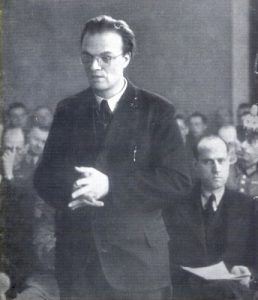I had never heard about Marie Kondo until a number of you mentioned her some months ago. She’s a 34-year-old Japanese organizing consultant and now has a show on Netflix. In it, she goes to people’s homes and helps them clean up their mess, clutter, and junk. People are full of confusion and are overwhelmed, and then Marie guides them, and they start crying and hugging her. She even helped a woman with her over-sized bag (You know, those huge bags with an infinity of stuff inside!): Marie helped her take out all the stuff, go through items one by one, and now the bag can close!
[Listen to Fr. Justin’s homily.]
Marie has struck a chord with the human heart. Most of our homes are messy, disorganized, with too much stuff, and this is actually tiring and depressing. The main question Marie asks when sorting through things is, “What sparks joy?” What is she doing? She’s helping us pay attention to a deeper joy.
By the way, one website reported that Pope Francis brought in Marie Kondo to clean up the Vatican and has gotten rid of all but five bishops! She asked him, “Does this bishop spark joy for you?” When he said, “No,” they took him out back and threw him out.
This cultural phenomenon reminds us of two truths: 1) The human person desires order, simplicity, and satisfaction. 2) Our homes usually reflect our souls—brothers and sisters, dear guests, sorry if that’s depressing. We have so many things because our philosophy focuses on things. We can’t get rid of things because our priorities in life aren’t clear. An orderly house usually reflects an orderly soul. But sometimes I’ve visited people’s homes… looked around… and thought, “Wow, this person really needs to go to Confession.” ![]()
And, be at peace: I know it’s extremely hard to keep a tidy house with kids. However, we still desire a tidy house, don’t we? And, perhaps if we had a bit more order in our souls, there’d be small signs of improvement.
The Gospel today says, “Jesus, full of the Holy Spirit, returned from the Jordan and was led by the Spirit in the wilderness, where for forty days he was tempted by the devil” (Lk 4:1-2). The catechism comments on this saying that Jesus enters into a “time of solitude” (CCC 538). Solitude is very important in life because this is where we encounter God and His voice, where we face our fears and discover our true self, where we can sort through the clutter of our life and see God’s priorities.
40 days, as many of us know, has great significance in the Bible:
1) In Genesis, the flood that Noah had to avoid lasted 40 days (Gen 7:4,17);
2) Moses received the Ten Commandments after being on Mt. Sinai for 40 days (Ex 34:28);
3) How long were the Hebrew people wandering in the desert? 40 years (Dt 8:2);
4) The spies’ inspection of Canaan: 40 days (Num 14:34);
5) Israel’s oppression by the Philistines: 40 years (Judg 13:1);
6) Elijah’s fasting: 40 days (1 Kg 19:8);
7) Nineveh’s opportunity to repent at the preaching of Jonah: 40 days (Jon 3:4).
So, 40 is the number of probation and testing (Ignatius Catholic Study Bible, 113).
We are now in a period of 40 days: Lent. Lent starts on Ash Wednesday, goes for six weeks, and ends on Easter Sunday. If we subtract the six Sundays of Lent, that gives us 40 days of penance and renewal, back to the basics, clearing away the junk in our lives, and focusing on the deeper satisfaction.
“He ate nothing at all during those days, and when they were over, he was famished” (Lk 4:2). Fasting means letting go of something good for something better; we let go of food to remember that God is our spiritual food—this is what we need!
“The devil said to him, ‘If you are the Son of God, command this stone to become a loaf of bread.’ Jesus answered him, ‘It is written, “Man does not live by bread alone”’” (Lk 4:3-4). There are two comments we can make about this:
1) We’re always tempted by the devil, our culture, and ourselves to satisfy our wants, not our needs. Of course, in Jesus’ case, His hunger is a legitimate need, but He forsakes even this need to teach us that we have a deeper need, for God. In our case, when we fast, we’re giving up wants for that which really satisfies us.
Matthew Kelly recounts a fundamental experience for him when he was 18, as a marketing major in an Australian college. In his first lecture, the professor said, “Marketing is about… creating a desire in people that in turn makes them feel that they need your product or service. It’s about making people feel they need things even if they don’t” (The Rhythm of Life, 47). Matthew was shocked! He looked around and the 600 other students around him weren’t even fazed; they just accepted this idea. We’ve all bought into the lie: We think getting our wants met will make us happy. And then we need Marie Kondo to get us out of the mess.
Remember the Vitamin N video? Our children are suffering; they can be petulant, moody, sullen, and ungrateful because we’ve taught them to focus on what they want, and so they’re unaware of what they truly need.
Jesus is saying: “No! Man does not live by bread alone!” This is Fr. Alfred Delp, a German Jesuit born in 1907, reared Lutheran, became Catholic at 14, joined the Jesuits at 19, and was ordained at 30. At the age of 37, he was hanged by the Nazis for his resistance. Fr. Delp said, “Bread is important, freedom is more important, but most important of all is unbroken fidelity and faithful adoration” (Quoted by Pope Benedict XVI, Jesus of Nazareth, vol. 1, 33). Look at that man. He fasted. He had great courage and joy because He was faithful to God and spent time adoring Him.
2) If man doesn’t live by bread alone, by what does he live? “By every word that proceeds from the mouth of God” (Mt 4:4). It’s God’s word that satisfies. I remember a time when I was having lunch with a friend. However, he wasn’t eating. I asked why. He said with a smile, “I just had the best spiritual direction… and I don’t feel like eating.” When we’re nervous or stressed, many of us eat more. But when we’re happy at a deep level, we don’t have the same physical cravings. Because God’s word satisfies.
And remember what St. John’s Gospel calls Jesus? We heard it at Christmas. “In the beginning was the Word, and the Word was with God, and the Word was God” (Jn 1:1). Jesus is the Word that satisfies! That’s the point of the homily. When we encounter Jesus, possess Him, are loved by Him and love Him in return, then we’re satisfied.
Isn’t it interesting that He gave Himself to us under the form of bread, in the Eucharist? He took that appearance to remind us that He’s the one who satisfies us, not bread or things.
Here are four suggestions to receive the satisfaction Jesus offers:
First, the desert fathers, who were the earliest Christian hermits and monks, talked about going into the desert with Jesus. Why? To receive clarity, answers to questions, or to overcome a problem (Douglas Burton-Christie, The Word in the Desert, 198). They simplified, got rid of distractions, and spent time alone with Jesus.
You know that feeling you get when you leave the city and go to the mountains or to the water? That’s what we’re describing. During Lent, we want to go into the desert with Jesus and fast. When we’re hungry, we’ll pray, “Jesus, why am I doing this? Jesus, I don’t need more things and I don’t need more food. I need more love, joy, peace, and clarity about who I am. Give me those things.”
Second, at Mass, during Lent, we’re going to simplify certain parts: At the end of Mass, we won’t have a recessional hymn, but the servers, Deacon, and I will process out in silence. During that time, we might start getting antsy, but we’re going to resist the temptation to leave early. Instead, we’re going to go deeper into prayer, and practice gratitude! We have just received Jesus in His word, and perhaps in Holy Communion. We all must learn not to leave Mass early, to be the first to get to our car, but to wait in patience, build up that virtue, and learn to love silence. Silence is where we encounter God and our true selves. We’ll also limit the amount of organ music at Mass during Lent.
Third, and this is a fun one: How can we change our homes to make them more Christ-centered? How about cleaning them, because God is a God of order. If you want, you can pray to St. Marie Kondo for help, I mean, watch her videos! See also if our homes express that Jesus is the centre of our lives.
The saints put things in their rooms that would help them focus on God! My bedroom doesn’t have a lot of items, because simplicity helps me to pray and relax, but I chose my favourite religious painting because it expresses my spirituality.
What’s your spirituality? Express it! A crucifix, some candles, print out one of your favourite images of Jesus or a saint. Maybe take a picture of Deacon Andrew and put it up as a Lenten penance.
Fourth, because we’re talking about priorities and excess, let’s remind ourselves why we’ve spent money to beautify the Mass, why someone bought a new monstrance for us, the new processional cross, and why we are donating ten percent of our collection to the works of charity, etc. Some people argue that all our money should go to the parish centre. But I believe that’s incorrect theologically and financially.
Theologically, God and His teachings come first. The Mass is the most important thing we do. The Eucharist, as we discussed a month ago, is the source and summit of our lives. Now, people spend money on what’s important to them. If we spend money first on buildings, then evangelization and those in need, that means buildings are more important to us. The reason why most parishes are dying is because they focus on maintaining things rather than spiritual growth! Does God need these liturgical things? No, but He deserves them. We spend money on weddings and rings because they’re important. Could we use the money that we donate to the needy? Of course! That’s why it’s a sacrifice.
Financially, isn’t it interesting that we’ve raised more money than ever before? We spent this money on the confessionals, on the chapel, and people offered to pay for them; we spent money on the air conditioning in order to take care of people, and look what happened. God gave us more. Why? Because, when people put Him first, do His mission, He supplies the resources. So, please understand why we will continue to prioritize spending money on evangelization, spiritual growth, the Mass, and on works of mercy. Believe me, I want this parish centre, and I believe God does, too. The fastest way to get there is to focus and spend money on the right things. This was the test of fidelity and adoration Fr. Alfred Delp witnessed.
- Our new monstrance
- Our new processional cross
- Our renovated confessionals
Do we truly believe that Jesus, the Eucharist, is our satisfaction?
I listened to a talk by Betty Brennan, one of the talks available at our Lighthouse Media stand. She was a good Catholic: went to Mass, didn’t have many questions and wasn’t too involved in the Church. But when her daughter was born with a terminal brain disease and died two years later, she had a tremendous anger towards God.
In the orchestra for which she played, four of the members were Satanic priests, and one of them invited her out every night for coffee, and allowed her to share her brokenness. That’s how she got involved in Satanic rituals and worshiping the devil.
However, one time her friend, Pat, invited her to a healing Mass. Betty went and made the lights go out, then the candles go out. Sometime later, Pat said, “You know, I go other times to this place, and nothing happens. Only when you’re here. And you act very strange. You become terrified. You break out into a sweat, and did you ever notice: You stay at Mass at the beginning and then you take off?” So, during one Mass, when she went out, she knocked over a priest, and he went after her. He realized there was something else going on, and said, “Who are you, in the name of Jesus?”
The deliverance from the devil took a year and a half, receiving the Eucharist many times, and spending time with the Eucharist. Here’s the key point she teaches: Satanists know the value of the sacraments, they’re terrified of the power of the sacraments. She says if we had a real witch here, 2000 hosts and one consecrated, that witch would be able to tell which one was consecrated, which is the Body, Blood, soul and divinity of Jesus Christ (Betty Brennan, Former Satanist Becomes Catholic).
I’ve never forgotten that story. Our enemies know the reality and power of the Eucharist. We should know it, too! But the difference will be that we love the Eucharist like Betty! Yes, Jesus is truly present in the Eucharist, and He is our deepest satisfaction.






